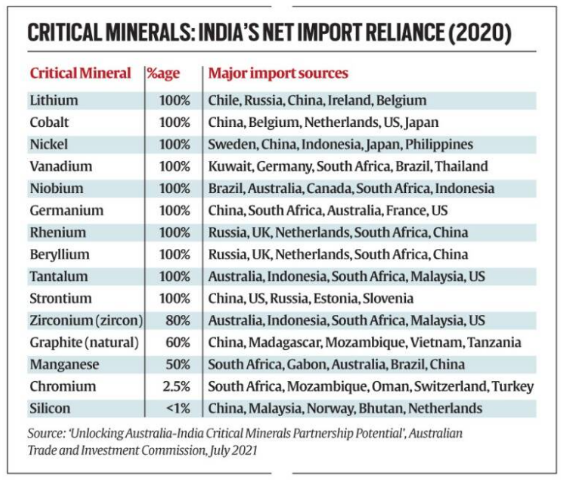Context:
According to the first annual review of the sector by the International Energy Agency (IEA), the supply of minerals critical to the green energy transition could move close to levels needed to support climate pledges by 2030.
About Critical Minerals:
- These are minerals that are essential for clean energy, economic development and national security.
- These are essential for the advancement of many sectors, including hightech electronics, telecommunications, transport, and defense.
The Statistics:
- From 2017 to 2022, the demand for lithium tripled, cobalt increased by 70%, and nickel rose by 40%, primarily driven by the energy sector.
- According to the IEA, the market for energy transition minerals reached $320 billion in 2022 and is expected to continue growing rapidly.
Critical Minerals in India:
- Expert Committee under the Ministry of Mines has identified a set of 30 critical minerals for India.
- These are Antimony, Beryllium, Bismuth, Cobalt, Copper, Gallium, Germanium, Graphite, Hafnium, Indium, Lithium, Molybdenum, Niobium, Nickel, PGE, Phosphorous, Potash, REE, Rhenium, Silicon, Strontium, Tantalum, Tellurium, Tin, Titanium, Tungsten, Vanadium, Zirconium, Selenium and Cadmium.
- India has set up KABIL or the Khanij Bidesh India Limited, a joint venture of three public sector companies with an aim:
- To ensure a consistent supply of critical and strategic minerals to the Indian domestic market.
- It ensures the mineral security of the nation.
- It also helps in realizing the overall objective of import substitution.

Image Source: The Indian Express
Three-Stage Assessment Process:
- Analysis of Global Strategies: The expert team studied the strategies of major economies and identified 69 elements/minerals considered critical by these countries.
- Used by countries such as Australia, USA, Canada, UK, Japan and South Korea.
- Inter-Ministerial Consultation: Different ministries were consulted to identify minerals critical to their respective sectors.
- Comments and suggestions were received from the important associated national bodies like the Ministry of Power, Department of Atomic Energy, etc.
- Empirical Formula for Criticality Evaluation: An empirical formula was derived considering economic importance and supply risk, similar to the methodology used by the European Union.
Significance:
- Clean Energy: Countries around the world are moving towards a transition to clean energy and digital economy and affordability and speed of energy transitions will be heavily influenced by the availability of critical mineral supplies.
- Economy: Any supply shock can severely affect the economy and strategic autonomy of a country over dependent on others to procure critical minerals.
- But these supply risks exist due to rare availability, growing demand and complex processing value chain.
- Legislation: The elements are playing a very important role in almost all sectors and countries are moving to enact laws and rules regarding it.
- The US, Canada, the EU and Australia have introduced regulatory legislation while resource-rich nations including Indonesia, Namibia and Zimbabwe have imposed restrictions on export of unprocessed mineral ores.
Challenges:
- Scarcity: India does not have many of the mineral reserves, or its requirements may be higher than the availability, necessitating reliance on foreign countries to meet domestic demands.
- Supply Chain Vulnerabilities: The lack of availability of these minerals or the concentration of extraction or processing in a few geographical locations could potentially lead to supply chain vulnerabilities and even disruption of supplies.
- China Factor: China is the world’s largest producer of 16 critical minerals, including cobalt and rare earth elements. The country’s dominance in critical minerals production and processing raises concerns of a supply disruption in case of a geopolitical conflict (Example: US-China trade war).
- Russia-Ukraine War: Both Russia and Ukraine have reserves of these critical minerals and the war between the two countries has implications for these critical mineral supply chains.
- (Russia: nickel, palladium, titanium sponge metal, and the rare earth element scandium & Ukraine: titanium, lithium, cobalt, graphite, and rare earth elements, including tantalum, niobium, and beryllium).
- Shifting Balance of Power: As the balance of power shifts across continents and countries, the critical mineral supply chains may get affected due to the strategic partnership between China and Russia.
- Developed countries have jointly drawn up partnership strategies, including the Minerals Security Partnership (MSP) and G7’s Sustainable Critical Minerals Alliance.
Way Forward:
- Diversifying Sources of Supply: Diversifying the sources is a must to reduce vulnerability to disruptions in supply caused by geopolitical factors, trade restrictions, or other uncertainties.
- Ensuring Clean and Responsible Sourcing: There is a need to promote sustainable and responsible practices throughout the critical minerals value chain to minimize the adverse impacts and ensure a sustainable energy transition.
- Ensuring Resource Availability: This includes evaluating the domestic reserves of critical minerals and exploring opportunities for their sustainable extraction or sourcing from diverse international markets.
- Counter Supply-Side Challenges: According to IEA, three layers of supply-side challenges need to be addressed to ensure rapid and secure energy transitions.
- Whether future supplies can keep up with the rapid pace of demand growth in climate-driven scenarios.
- Whether those supplies can come from diversified sources.
- Whether those volumes can be supplied from clean and responsible sources.
- Adoption of IEA Strategy: We must adapt the strategy, which the IEA has called for, that brings together investment, innovation, recycling, rigorous sustainability standards and well-designed safety nets.
Additional Information:
- International Energy Agency (IEA):
- An autonomous Intergovernmental Organisation established in 1974 in Paris, France in the wake of the oil crisis of 1973-1974, to help its members respond to major disruptions in oil supply.
- Objectives:
- It ensures reliable, affordable and clean energy for its member countries and beyond.
- It deals with economic development, energy security and environmental protection.
- It also tracks and analyzes key global energy trends, promoting sound energy policy and encouraging multinational energy technology cooperation.
- Reports by IEA:
- World Energy Outlook Report
- World Energy Investment Report
- World Energy Statistics
- World Energy Balances
- Energy Technology Perspectives
|
News Source: businessline
![]() 18 Jul 2023
18 Jul 2023

